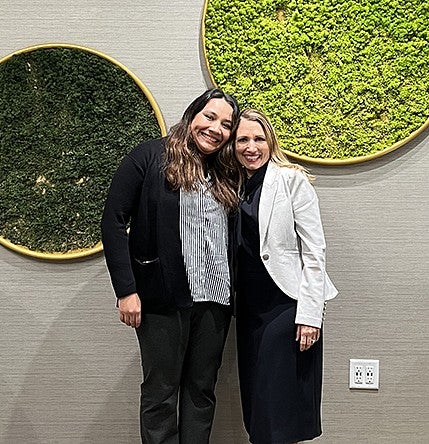
Marisa Macy, “Double Duck” (MS Special Education ’00, PhD Special Education ’04) and John P. Ellbogen Foundation Professor of Early Childhood Education at the University of Wyoming, is a UO alumna who believes in paying it forward.
In 2022, she signed up to participate in the Division for Early Childhood’s DECIDE mentorship program and was paired with current UO special education doctoral student, Karen Zyskind, 2023-24 recipient of the Davis-Bricker Graduate Research Award.
Beth Harn, PhD, professor of Special Education at the University of Oregon and Karen’s doctoral advisor, believes that outside mentorship is a crucial element of student success. “Having mentors that are at a different university, like Dr. Macy, is so critical for our doctoral students so they can see how other programs train the next generation of leaders and to provide additional supports and opportunities.”
When they met, Karen and Marisa felt an immediate connection. Both are first-generation college students who grew up in bilingual families. “Being a first-generation student, I have a lot of questions that other people may not have,” said Karen. She always felt nervous asking them until she met Marisa. “Even though we’re from different cultural backgrounds, I felt like we just shared so much… I could see myself in her.”
Marisa now refers to Karen as her “little duckling sister.” The two have a connection that has transcended the program and blossomed into a lasting relationship and, for Karen, a growing professional network and expanded vision of her future as a scholar and professional.
Initially, Karen didn’t know what to expect from the relationship. Marisa asked a lot of questions to learn about Karen's interests, motivations, and aspirations. Once she understood Karen better, she was prepared to offer more focused support and guidance. The two combined their interests in authentic assessment and working with culturally and linguistically diverse children and dove into an exploration of policy and legal frameworks and how to translate those requirements into equitable, trauma-informed practices for providers.
They presented their work at the Division of Early Childhood of the Council for Exceptional Children’s 2023 conference in Minneapolis, Minnesota. After the conference, Marisa suggested they develop the presentation into a paper. At first, the task was daunting to Karen, but Marisa helped her break the work into manageable parts and build her confidence. When their first submission was rejected, “I thought, maybe this isn’t a good idea,” said Karen, “but Marisa said no, we just go knock on another door, we just find a different journal.” Marisa was right; the paper was published by Perspectives On Early Childhood Psychology and Education in spring 2024.
Her relationship with Marisa has also given Karen access to professional networks and opportunities she would not otherwise have. “If there's an opportunity, and she thinks of me, she'll send it my way,” said Karen. At conferences, where it can be difficult to break into pre-existing networks and social groups, Marisa has, again, opened new doors for Karen. “I get folded into the network she has already established.”
Following their work together, Karen’s dissertation has shifted to focus more on the “legal and policy frameworks that shape the systems students are being evaluated under.” She is particularly interested in methods for gathering accurate language information about children before assessment.
She isn’t sure what the future holds, but her work at UO and with Marisa has helped her build a more expansive vision of what her professional life could be. “My eyes have opened to the opportunities, because before I thought there was only one set way. I've come to see that there are many ways to approach these questions that I have.”
Whether her focus lies in research, policy, or working with speech-language pathologists or other direct service providers, “as long as I’m doing work that is creating an impact for children and families whose first language is not English, whose culture is different from the mainstream, and who are trying to navigate the educational system… I will be happy.”
Mentorship is at its best when “people get together who want good things for each other,” said Marisa. The relationship is not “value evaluative” and exists outside the power dynamics of a student’s relationship with an advisor, professor, or dissertation committee member. “I’m just somebody who wants good things for my fellow ducks.”
